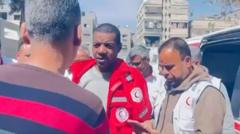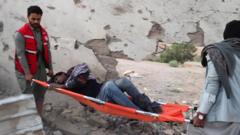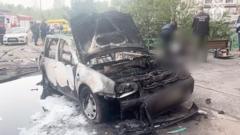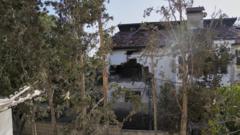The case of Assad al-Nassasra, a paramedic detained by Israeli forces during an operation that killed numerous emergency workers, has drawn significant attention. His release, along with other detainees, has sparked renewed scrutiny of Israeli military actions and the ongoing humanitarian crisis in Gaza.
Gaza Paramedic Released After 37 Days in Israeli Detention Amid Controversy

Gaza Paramedic Released After 37 Days in Israeli Detention Amid Controversy
Palestinian Red Crescent confirms the return of paramedic Assad al-Nassasra following deadly Israeli military operations.
The Palestinian Red Crescent Society has announced the release of Assad al-Nassasra, a medic who had been missing for 37 days after the Israeli military's deadly attack on emergency workers in southern Gaza. Al-Nassasra, who was confirmed to be in Israeli detention by the International Committee of the Red Cross, was among ten detainees freed at a border crossing on Tuesday. The Israeli military has yet to comment but previously acknowledged holding him during their internal investigation into the incident that resulted in the deaths of fifteen emergency personnel, including eight paramedics.
On March 23, Israeli forces opened fire on an ambulance convoy responding to an emergency call in the northern Rafah area, with later evidence suggesting that the vehicles had their emergency lights activated. Initial Israeli military claims suggested that soldiers fired at "suspicious vehicles," though they later retracted this claim after reviewing video footage from one of the deceased paramedics. The investigation into the attack cited "operational misunderstandings" and resulted in the dismissal of a deputy commander, while the Palestine Red Crescent described the findings as an attempt to justify what they label a "war crime."
A senior UN official has expressed concern that the lack of accountability for the attack is detrimental to international law. The humanitarian situation following the incident remains dire, with calls for greater protections for medical personnel and adherence to international regulations.
As the conflict continues to evolve, the interplay between military actions and humanitarian responsibilities remains a focal point of international discussions concerning the Israeli-Palestinian situation.
On March 23, Israeli forces opened fire on an ambulance convoy responding to an emergency call in the northern Rafah area, with later evidence suggesting that the vehicles had their emergency lights activated. Initial Israeli military claims suggested that soldiers fired at "suspicious vehicles," though they later retracted this claim after reviewing video footage from one of the deceased paramedics. The investigation into the attack cited "operational misunderstandings" and resulted in the dismissal of a deputy commander, while the Palestine Red Crescent described the findings as an attempt to justify what they label a "war crime."
A senior UN official has expressed concern that the lack of accountability for the attack is detrimental to international law. The humanitarian situation following the incident remains dire, with calls for greater protections for medical personnel and adherence to international regulations.
As the conflict continues to evolve, the interplay between military actions and humanitarian responsibilities remains a focal point of international discussions concerning the Israeli-Palestinian situation.

















